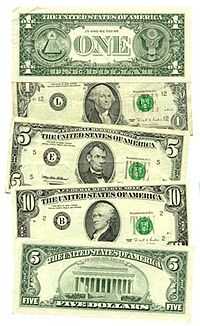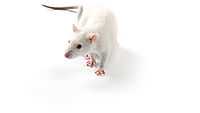Economics
Economics is the study of the value system and rewards of a particular society.
Business
A business is a legally recognized organizational entity designed to provide goods or services.[1]
Def.
- a "person's occupation, work, or trade",[2]
- an activity that someone is engaged in,
- work that has to be done or matters that have to be attended to, or
- the practice of making one's living by engaging in commerce
is called a business.
Money

Def. a current medium of exchange in the form of coins and banknotes is called money.
Trade
Def.
- buying "and selling of goods and services on a market"[3] or
- an "instance of bartering items in exchange for one another"[3]
is called trade.
Theoretical economics
Def. "a science which studies human behaviour as a relationship between ends and scarce means which have alternative uses"[4] is called economics.
Alternately,
Def. a science that studies the production, consumption, and transfer of wealth is called economics.
Research
Hypothesis:
- The economics of entrepreneurship favors an open market.
Control groups

The findings demonstrate a statistically systematic change from the status quo or the control group.
“In the design of experiments, treatments [or special properties or characteristics] are applied to [or observed in] experimental units in the treatment group(s).[5] In comparative experiments, members of the complementary group, the control group, receive either no treatment or a standard treatment.[6]"[7]
Proof of concept
Def. a “short and/or incomplete realization of a certain method or idea to demonstrate its feasibility"[8] is called a proof of concept.
Def. evidence that demonstrates that a concept is possible is called proof of concept.
The proof-of-concept structure consists of
- background,
- procedures,
- findings, and
- interpretation.[9]
See also
- Econometrics
- Macroeconomics
- Microeconomics
- School:Economics
References
- ↑ Wikipedia: Business (disambiguation)
- ↑ "business, In: Wiktionary". San Francisco, California: Wikimedia Foundation, Inc. 11 April 2015. Retrieved 2015-05-18.
- 1 2 "trade, In: Wiktionary". San Francisco, California: Wikimedia Foundation, Inc. 14 April 2015. Retrieved 2015-05-18.
- ↑ Lionel Robbins (1932). 15 An Essay on the Nature and Significance of Economic Science. London. http://books.google.com/books?id=nySoIkOgWQ4C&printsec=find&pg=PA15#v=onepage&q&f=false 15.
- ↑ Klaus Hinkelmann, Oscar Kempthorne (2008). Design and Analysis of Experiments, Volume I: Introduction to Experimental Design (2nd ed.). Wiley. ISBN 978-0-471-72756-9. http://books.google.com/?id=T3wWj2kVYZgC&printsec=frontcover.
- ↑ R. A. Bailey (2008). Design of comparative experiments. Cambridge University Press. ISBN 978-0-521-68357-9. http://www.cambridge.org/uk/catalogue/catalogue.asp?isbn=9780521683579.
- ↑ "Treatment and control groups, In: Wikipedia". San Francisco, California: Wikimedia Foundation, Inc. May 18, 2012. Retrieved 2012-05-31.
- ↑ "proof of concept, In: Wiktionary". San Francisco, California: Wikimedia Foundation, Inc. November 10, 2012. Retrieved 2013-01-13.
- ↑ Ginger Lehrman and Ian B Hogue, Sarah Palmer, Cheryl Jennings, Celsa A Spina, Ann Wiegand, Alan L Landay, Robert W Coombs, Douglas D Richman, John W Mellors, John M Coffin, Ronald J Bosch, David M Margolis (August 13, 2005). "Depletion of latent HIV-1 infection in vivo: a proof-of-concept study". Lancet 366 (9485): 549-55. doi:10.1016/S0140-6736(05)67098-5. http://www.ncbi.nlm.nih.gov/pmc/articles/PMC1894952/. Retrieved 2012-05-09.
External links
- African Journals Online
- Bing Advanced search
- Google Books
- Google scholar Advanced Scholar Search
- JSTOR
- Lycos search
- NASA's National Space Science Data Center
- NCBI All Databases Search
- Office of Scientific & Technical Information
- Questia - The Online Library of Books and Journals
- SAGE journals online
- The SAO/NASA Astrophysics Data System
- Scirus for scientific information only advanced search
- Spacecraft Query at NASA.
- SpringerLink
- Taylor & Francis Online
- WikiDoc The Living Textbook of Medicine
- Wiley Online Library Advanced Search
- Yahoo Advanced Web Search
| |||||||||||||||||||||||||||||||||||||||||||||||||||||
| ||||||||||||||||||||||||||||||||||||||||||||||||||||||||||||||
| |||||||||||||||||||||||||||||||||||||||||||||||||||||
| |||||||||||||||||||||||||||||||||||||||||
| ||||||||||||||||||||||||||||||||||||||||||||
![]() This is a research project at http://en.wikiversity.org
This is a research project at http://en.wikiversity.org
| |
Development status: this resource is experimental in nature. |
| |
Educational level: this is a research resource. |
| |
Resource type: this resource is an article. |
| |
Resource type: this resource contains a lecture or lecture notes. |
| |
Subject classification: this is an Anthropology resource. |
| |
Subject classification: this is an economics resource. |